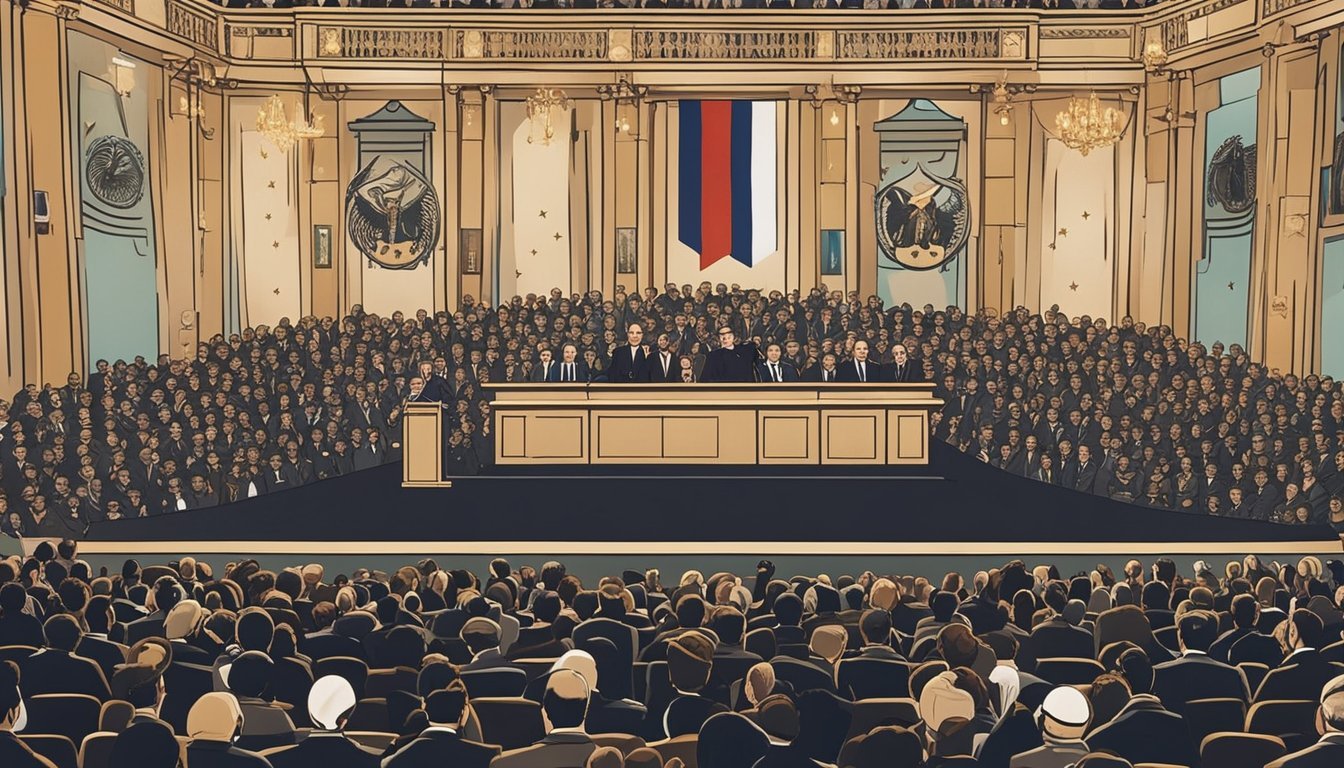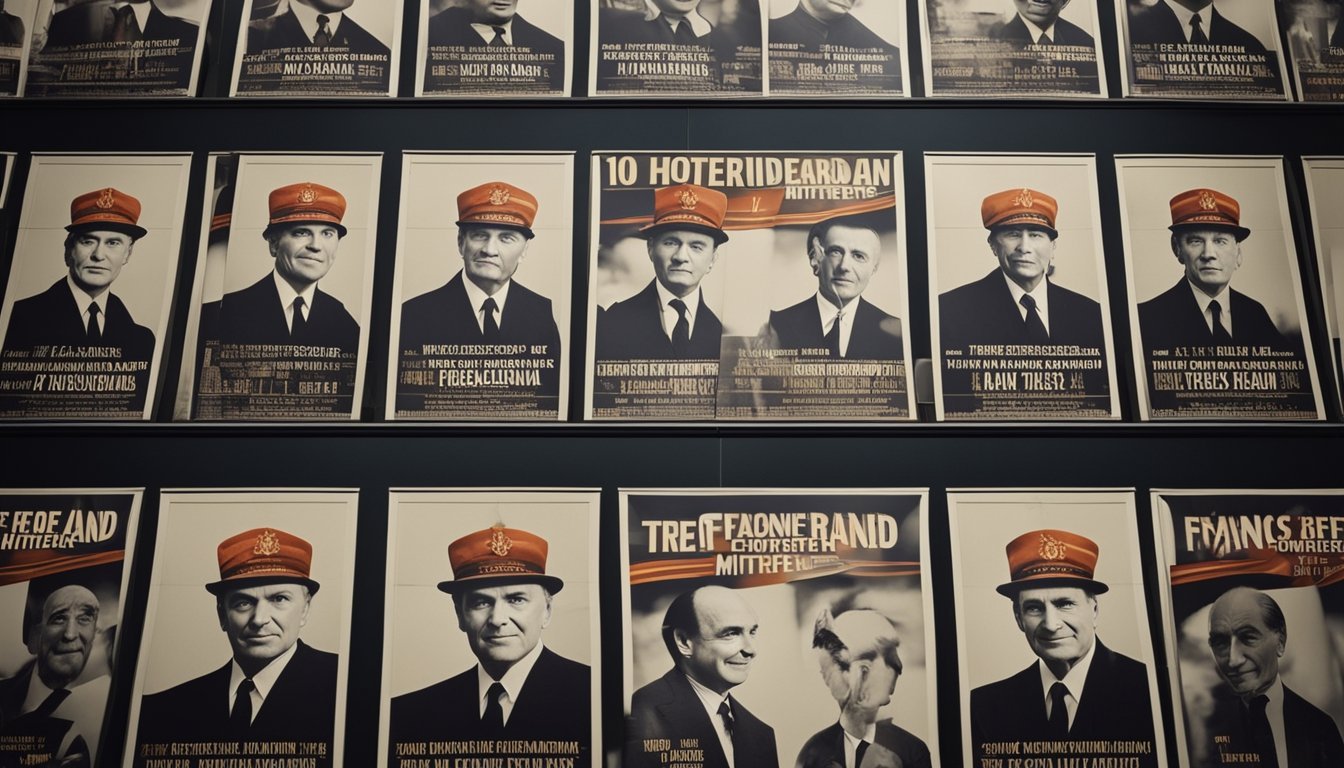10 Films Examining the Presidency of François Mitterrand
A Cinematic Exploration
François Mitterrand's presidency, spanning from 1981 to 1995, was a transformative period in French history, marked by significant political, social, and economic changes. His era brought both triumphs and controversies, leaving an indelible mark on France and its global standing.
What better way to explore this critical period than through cinema? The films dedicated to Mitterrand's time in office offer a unique lens through which to understand his complex legacy. These cinematic works provide valuable insights into his policies, personal life, and the broader impact of his leadership.
1) The Conquest (2011)
"The Conquest" is a political drama directed by Xavier Durringer. It focuses on Nicolas Sarkozy's journey to becoming the President of France. The timeline begins in 2002 and culminates in his election in 2007.
Denis Podalydès stars as Sarkozy, portraying his determination and strategic maneuvers. Florence Pernel plays Cécilia, his then-wife, adding a personal dimension to the political narrative.
The film offers an inside look into Sarkozy's political strategies and the challenges he faced. It also highlights his complex relationships with political figures like Jacques Chirac.
This film is notable for its detailed depiction of recent political history. It's a revealing portrayal of the machinations behind Sarkozy's rise to power. Those interested in French politics will find it insightful.
For more information, check Wikipedia or IMDb.
2) The French Minister (2013)
"The French Minister" is a 2013 French comedy film directed by Bertrand Tavernier. The film provides a satirical look at the workings of the French Foreign Ministry.
Adapted from the comic strip "Quai d'Orsay" by Christophe Blain and Abel Lanzac, the story centers around a young speechwriter, Arthur Vlaminck, played by Raphaël Personnaz.
He navigates the challenging dynamics of the political world under the guidance of the charismatic and unpredictable Minister of Foreign Affairs, Alexandre Taillard de Vorms.
Thierry Lhermitte portrays the energetic and commanding minister, whose character is inspired by the real-life politician Dominique de Villepin. The film balances humor with a portrayal of the intense and meticulous world of foreign diplomacy.
Bertrand Tavernier's direction captures the complexities and absurdities of political life, making it both entertaining and thought-provoking.
With a strong cast and sharp writing, "The French Minister" provides an insightful depiction of the behind-the-scenes workings of the French government. For more detailed information, visit the IMDb page.
3) A Self-Made Hero (1996)
"A Self-Made Hero" is a film directed by Jacques Audiard and released in 1996. The story revolves around Albert Dehousse, who discovers that his father wasn't a war hero and that his mother collaborated during World War II.
Set in France at the end of World War II, Albert decides to leave his wife and move to Paris. He gradually insinuates himself with the French Resistance, despite initially being denied participation due to his status as the only child of a war widow.
The film explores themes of identity and reinvention, with Albert fabricating his heroic past to gain prestige and recognition. Through clever manipulation, he manages to convince others of his supposed bravery during the war, achieving a life of fabricated heroism.
For more information, visit the Wikipedia page.
4) The Elysée Agreement (2000)
"The Elysée Agreement" (2000) delves into one of the key moments of François Mitterrand's presidency with a focus on diplomacy. It offers a detailed portrayal of discussions and decisions that shaped European political landscapes.
The film portrays Mitterrand's strategic interactions with other European leaders. It captures the critical negotiations that led to significant agreements, underscoring his role in European unity.
This movie offers a closer look at the intense political environment within the Élysée Palace. The portrayal of Mitterrand’s statesmanship provides insights into his diplomatic style and leadership.
Viewers can witness the historical significance of the Elysée Agreement and its impact on European politics. The film depicts real events, bringing history to the screen with dramatic tension and authentic storytelling.
5) Une histoire de France: François Mitterrand (2006)
"Une histoire de France: François Mitterrand" (2006) offers a compelling look into the life and presidency of François Mitterrand.
The film covers Mitterrand's early political career, including his time in Vichy during World War II. It follows his escape from a German prisoner camp and his emerging political ambitions.
Viewers get a chronological view of Mitterrand's rise, focusing on his significant achievements and challenges. The documentary explores the socio-political landscape that shaped his presidency.
By highlighting both his triumphs and controversies, the film provides a nuanced portrait of one of France's most influential leaders.
For more information, visit the Wikipedia page.
6) Le Dernier Mitterrand (2005)
Le Dernier Mitterrand (2005) is a film directed by Robert Guédiguian. It offers a detailed look into the final period of François Mitterrand's life, one of France's most pivotal political figures. The film is adapted from the book "Le Dernier Mitterrand" by Georges-Marc Benamou.
Michel Bouquet stars as François Mitterrand, presenting a nuanced portrayal of the President during his last months in office. The plot revolves around his interactions with a young journalist, Antoine Moreau, played by Jalil Lespert.
The film provides insight into Mitterrand’s reflections on power, legacy, and mortality. It tackles the complexities of his political career, including controversial aspects and notable achievements.
"Le Dernier Mitterrand" is dialogue-heavy, making it essential for viewers to have knowledge of 20th-century French politics. Historical figures like police chief René Bousquet are referenced, adding depth to the narrative.
For more information about this film, visit its Wikipedia page or IMDb.
7) Mitterrand's Fall (2009)
"Mitterrand's Fall" (2009) takes a critical look at the later years of François Mitterrand's presidency. This film delves deeply into the political and personal controversies that marked the end of his political career.
The narrative focuses on the various scandals that emerged during his final years in office. From corruption allegations to personal indiscretions, the film paints a vivid picture of a leader grappling with the pressures of maintaining power.
The story not only highlights the political turmoil but also explores Mitterrand's complex personality. His strategic maneuvers and the lengths he went to preserve his legacy are sharply examined. This portrayal provides insight into his character, showing both his strengths and flaws.
"Mitterrand's Fall" uses a combination of historical footage and dramatized reenactments to tell its story. The film remains grounded in factual events while providing an engaging view of his fall from grace.
For additional information on "Mitterrand's Fall," visit IMDb.
8) The Last Campaign (2008)
"The Last Campaign" (2008) explores the final years of François Mitterrand’s presidency. This film delves into the intricate political landscape of France during the late 1990s, offering a compelling portrayal of the challenges and triumphs faced by Mitterrand as his time in office came to an end.
The narrative focuses on his efforts to implement his vision for France while battling personal and political obstacles. These challenges are depicted with a nuanced understanding of the interplay between Mitterrand's public duties and private struggles.
Directed with a keen eye for historical detail, "The Last Campaign" brings to life the complexities of Mitterrand’s leadership and his enduring impact on French politics. The film's realistic approach provides a comprehensive look into this significant period in French history.
For more information, see The Last Campaign on IMDb.
9) François Mitterrand et la guerre d'Algérie (2022)
François Mitterrand's tenure during the Algerian War is explored in this TV movie directed by Frédéric Brunnquell. Mitterrand, who held significant government positions like Minister of the Interior and Minister of Justice between 1954 and 1957, played a crucial role in shaping France's policies during this conflict.
The film features a mix of archival footage and dramatization, shedding light on Mitterrand's actions and perspectives. It highlights his controversial stance on the war, where he supported repressive measures against Algerian independence fighters.
Prominent figures, including historians and former colleagues, offer insights into Mitterrand's complex legacy concerning Algeria. The film aims to provide a balanced view by delving into both his political motivations and the broader context of French-Algerian relations during that era.
François Mitterrand et la guerre d'Algérie is a compelling watch for those interested in political history and the intricacies of colonial legacies. The film presents a nuanced portrayal of a leader whose decisions during the Algerian War continue to spark debate.
10) François Mitterrand, the Last 10 Years (2011)
Directed by Chapour Haghighat, "François Mitterrand, the Last 10 Years" is a detailed documentary that meticulously explores the final decade in the life of France's former president, François Mitterrand.
The film takes an in-depth look at Mitterrand's personal and political struggles during his last years, from his battle with prostate cancer to his reflections on his long political career.
Through interviews with close associates, archival footage, and personal commentary, the documentary paints a comprehensive picture of this complex figure. It focuses on his enduring influence on French politics and his efforts to shape his legacy during his final term in office.
More information on François Mitterrand, the Last 10 Years (2011).
Historical Context of François Mitterrand’s Presidency
François Mitterrand's presidency is marked by a complex political landscape and significant policy initiatives that transformed France during the 1980s and early 1990s.
Political Climate in 1980s France
The 1980s in France were characterized by significant political shifts and challenges. Mitterrand, having gained prominence in the French Socialist Party in 1971, led the party to victory in the 1981 presidential and parliamentary elections. This period marked the first time the French Left came to power since Charles de Gaulle's rule.
Economic difficulties, including high unemployment and inflation, created a turbulent atmosphere for Mitterrand’s government. He navigated between socialist ideals and pragmatic economic reforms, striving to balance social welfare policies with the need for economic stability. This era also saw increased tensions during the Cold War, influencing France’s foreign and domestic policy decisions.
Key Policies and Reforms
Mitterrand's presidency introduced several key policies and reforms aimed at social and economic transformation. Early efforts focused on nationalizing industries and banks, which aligned with socialist principles. These actions aimed to reduce unemployment and revitalize the economy but faced substantial pushback from opposition parties and economic sectors.
Significant social reforms included expanding social security, education system changes, and workers' rights enhancements. In foreign affairs, Mitterrand played a crucial role in European integration, significantly contributing to the formation of the European Union. His policies reflected a blend of progressive socialism and pragmatic governance, adapting to the evolving political and economic conditions of the time.
Cultural Impact of Mitterrand’s Presidency
François Mitterrand's presidency left a significant mark on French culture, with notable influences on cinema and enduring effects on public perception and his legacy.
Influence on French Cinema
Mitterrand’s presidency became a popular subject in French cinema. Films like The Last Mitterrand offered a nuanced portrayal of his final years in power. The character study in these films often highlighted his complex personality and political maneuvering.
Additionally, his era's political narratives inspired several documentaries and biopics. These films not only explored his political strategies but also delved into his personal life, offering audiences a comprehensive view of the man behind the office. His long tenure provided ample material for filmmakers to explore various themes.
Public Perception and Legacy
François Mitterrand's cultural legacy is multifaceted. He is remembered not only for his political achievements but also for his enigmatic personality. His influence continues to evoke interest in academic and popular discourse.
Mitterrand’s presidency is frequently discussed in modern French media and literature. His policies and personal contradictions remain a topic of debate. His era is often revisited to understand the evolution of French politics. Public opinion about him remains mixed, reflecting his complex legacy.
This enduring fascination has cemented Mitterrand as a pivotal figure in France’s cultural and political history, providing continuous inspiration for discussions, analyses, and artistic representations.








